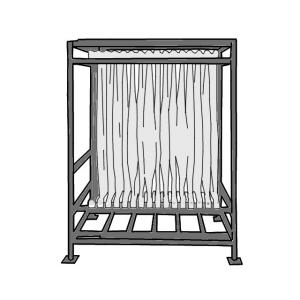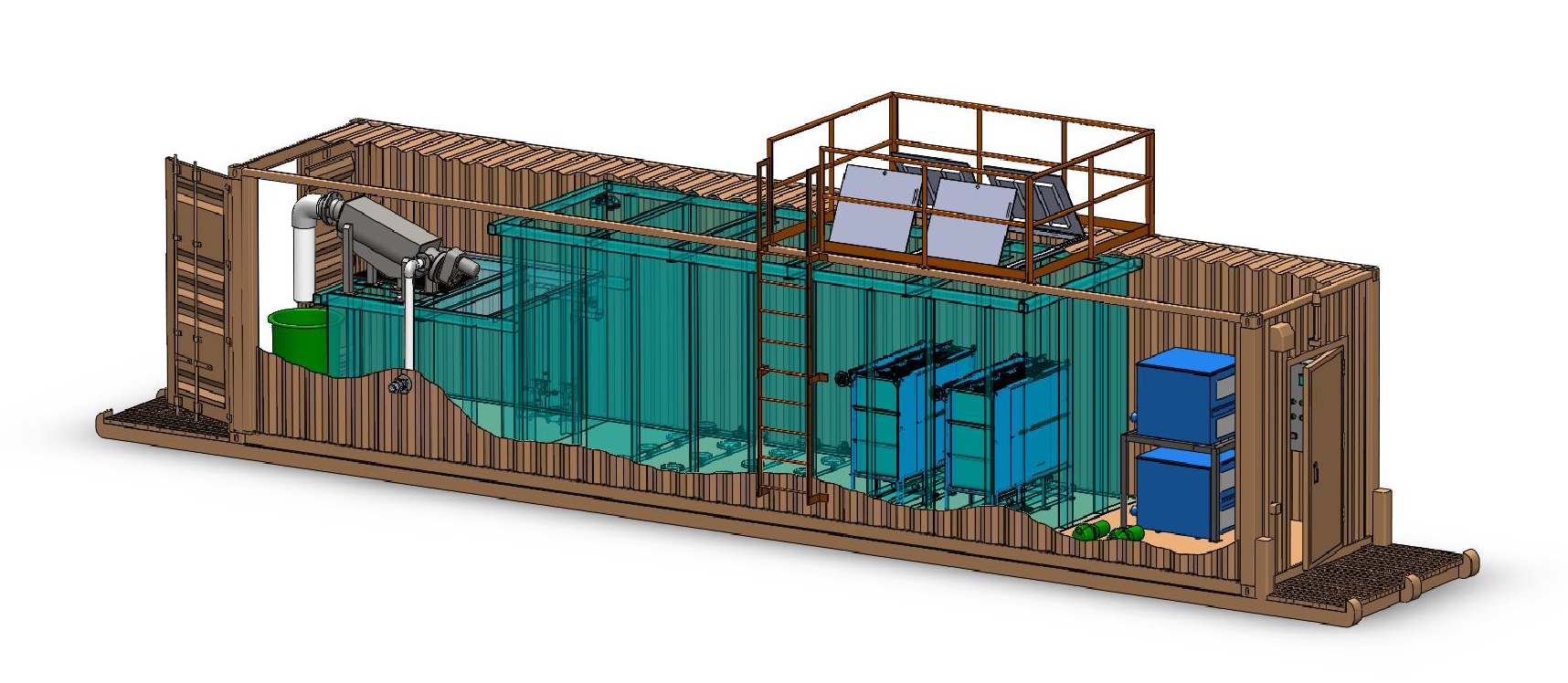The Benefits of Membrane Bioreactors in Sustainable Wastewater Administration
Membrane layer bioreactors (MBRs) represent a pivotal advancement in lasting wastewater administration, efficiently combining organic treatment with innovative membrane layer filtration modern technology. As the need for sustainable remedies escalates, checking out the complex benefits of MBRs might expose unexpected effects for the future of wastewater treatment systems.
Overview of Membrane Layer Bioreactors
Membrane bioreactors (MBRs) stand for a significant innovation in wastewater treatment technology, incorporating organic deterioration with membrane layer filtering to enhance the performance of the treatment procedure. This innovative system integrates the advantages of traditional turned on sludge processes with membrane layer technology, enabling improved solid-liquid separation. MBRs make use of semi-permeable membranes to separate cured water from biomass, resulting in high-grade effluent that can be recycled or securely discharged into the atmosphere.
The functional design of MBRs normally involves a bioreactor where microorganisms damage down raw material, complied with by a membrane layer unit that filters the blended alcohol. This arrangement not only reduces the impact of the therapy facility but likewise permits greater biomass concentrations and decreased hydraulic retention times. Moreover, MBRs are qualified of treating a larger series of contaminants, including virus and nutrients, making them ideal for various applications, from community wastewater treatment to commercial effluent handling.
The assimilation of MBRs right into wastewater management systems is indicative of a growing fad in the direction of lasting and reliable techniques in ecological design. Their capability to create top notch effluent while decreasing room needs settings MBR innovation as a principal in contemporary wastewater treatment solutions.
Boosted Effluent Top Quality

The membrane layer filtering process acts as a physical obstacle, allowing the retention of microorganisms and particle matter, which adds to a more clear and cleaner effluent (Membrane Bioreactor). Additionally, MBRs operate at greater biomass concentrations than standard triggered sludge systems, promoting extra effective biodegradation of pollutants. This causes a reduction in biochemical oxygen need (BOD) and complete suspended solids (TSS) degrees in the final effluent
Furthermore, MBRs demonstrate exceptional performance in dealing with challenging wastewater structures, such as industrial effluents and wastewater with high nutrient tons. As an outcome, the effluent created is often of greater top quality, enabling for even more flexible disposal choices and reduced environmental influence. Ultimately, the boosted effluent quality accomplished via MBR modern technology highlights its critical function in progressing sustainable wastewater administration techniques.
Water Reuse Opportunities
The top quality effluent generated by membrane layer bioreactors (MBRs) opens up considerable possibilities for water reuse in numerous applications. MBRs efficiently eliminate impurities, including pathogens, suspended solids, and raw material, causing treated water that meets or surpasses regulative criteria for reuse. This top quality enables the implementation of water recycling initiatives across varied markets.
One noticeable application remains in farming, where treated wastewater can be utilized for Visit This Link irrigation, promoting sustainable farming practices while saving freshwater resources. Furthermore, MBR-treated effluent can be utilized for industrial processes such as cooling, cleaning, and as a process water source, considerably minimizing the demand for drinkable water in these operations.
In metropolitan atmospheres, MBRs help with the use of recovered water for landscape irrigation, toilet flushing, and other non-potable usages, adding to the total strength of water systems. In addition, the assimilation of MBR modern technology in decentralized systems help in handling localized water needs, specifically in water-scarce areas.
Lowered Ecological Effect
How can the fostering of membrane layer bioreactors (MBRs) add to a decreased ecological effect in wastewater management? MBRs substantially boost the treatment performance of wastewater while reducing ecological disturbances. By incorporating organic therapy processes with membrane layer purification, MBRs efficiently remove a large range of toxins, consisting of organic matter, nutrients, and pathogens. This sophisticated filtration brings about higher-quality effluent, which is critical for shielding marine ecological communities and lowering the burden on natural water bodies.
In addition, MBRs run at lower hydraulic retention times compared to traditional systems, resulting in smaller treatment plant footprints. This small style minimizes land use, thereby maintaining natural habitats and biodiversity. The process also generates much less sludge than traditional methods, alleviating disposal challenges and reducing greenhouse gas discharges related to sludge management.
Additionally, MBRs assist in the recovery of beneficial resources, such as water and nutrients, adding to a circular economic situation. By making it possible for water reuse for watering or industrial procedures, MBRs help ease freshwater shortage, thus promoting sustainable water use techniques. Ultimately, the adoption of MBR innovation represents a considerable stride in the direction of decreasing the environmental influence of wastewater administration systems.
Financial Advantages of MBRs

Additionally, MBRs assist in the production of premium effluent, which can be reused for various applications, such as agricultural watering and industrial procedures - Membrane Bioreactor. This reuse ability can dramatically lower water procurement costs, supplying an economic reward for markets encountering strict water regulations
The portable style of MBR systems also results in decreased land needs, which is specifically useful in urban areas where real estate is pricey. By lessening room, communities and markets can conserve on land acquisition and upkeep expenditures.
Moreover, MBRs usually need less my response constant upkeep and have a longer lifespan than standard systems, additionally contributing to set you back financial savings. In summary, the financial benefits of MBRs-- varying from lowered functional costs to land savings and effluent reuse-- make click this them a compelling selection for lasting wastewater administration, using both prompt and long-lasting economic benefits.
Final Thought
Membrane bioreactors stand for a transformative method to lasting wastewater management, integrating organic therapy with sophisticated membrane layer filtration for superior effluent top quality. Their capacity for efficient contaminant removal facilitates water reuse, thus preserving crucial freshwater resources. Additionally, MBRs contribute to lowered ecological influences via compact layouts and reduced sludge generation. Economic benefits better improve their viability, making MBRs an appealing remedy for attending to the difficulties of wastewater treatment and promoting sustainable resource management.
Membrane bioreactors (MBRs) represent an essential advancement in sustainable wastewater administration, efficiently combining organic treatment with innovative membrane layer filtration innovation.Membrane layer bioreactors (MBRs) represent a considerable advancement in wastewater therapy technology, integrating organic degradation with membrane filtration to boost the performance of the therapy process.Achieving boosted effluent top quality is one of the most considerable benefits of using membrane layer bioreactors (MBRs) in wastewater therapy.Additionally, MBRs demonstrate excellent performance in dealing with tough wastewater structures, such as industrial effluents and wastewater with high nutrient tons.Incorporating membrane layer bioreactors (MBRs) right into wastewater monitoring not just minimizes environmental impact however likewise provides considerable economic benefits.